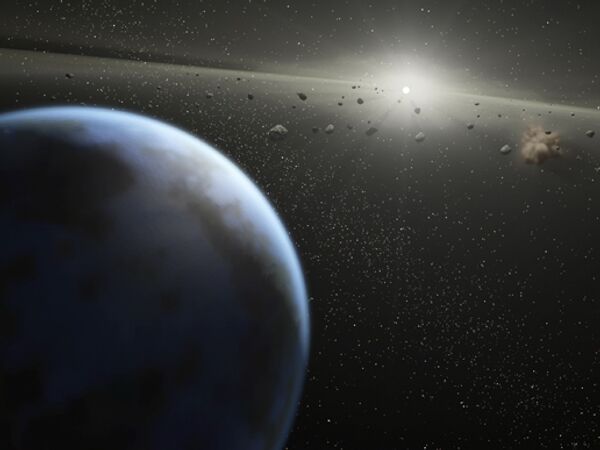MOSCOW, August 15 (RIA Novosti) – Scientists have discovered the forces that keep a near-Earth asteroid, 1950 DA, from breaking apart, according to a research published in Nature. The asteroid, considered by NASA a potential threat to the Earth, is a fast-rotating pile of debris that seems to be defying the forces of gravity.
Scientists say that gravity and friction are not able to prevent the asteroid from disintegrating. The debris, making a full rotation every 2.12 hours, is held together by cohesive forces known as Van Der Waals.
“We found that 1950 DA is rotating faster than the breakup limit for its density,” said Ben Rozitis, a postdoctoral researcher at the University of Tennessee, Knoxville, as quoted by the International Business Times.
The meteor that exploded over the Russian city of Chelyabinsk in February 2013 generated “renewed interest in figuring out how to deal with the potential hazard of an asteroid impact,” Rozitis said. “Understanding what holds these asteroids together can inform strategies to guard against future impacts,” he added.
There are several ways to prevent an asteroid from crashing into the Earth. "The best way to mitigate an impacting asteroid is to nudge it slightly several years before impact so that it changes course," he said, as quoted by Space.com. However, it might break up into “several smaller, hazardous asteroids,” the scientist warned.
"Therefore, with such an asteroid, you want to avoid interacting with it directly to prevent it breaking up. An alternative is to use a 'gravity tractor,' or a heavy spacecraft placed near the asteroid, which uses the force of gravity to pull the asteroid off course," Rozitis explained.
There is a slim chance that the asteroid will hit the Earth in 2880, according to NASA’s Near Earth Object Program. However, if it does crash into the planet, the consequences could be disastrous. For instance, if the asteroid crashes into the ocean, the impact could generate a tsunami at least 200 feet high, Space.com said citing a 2003 study.




